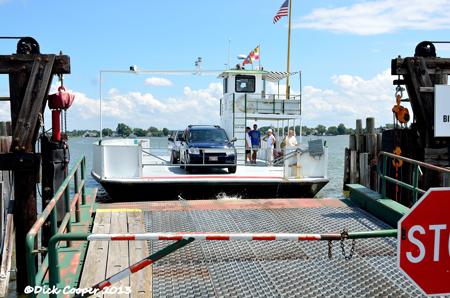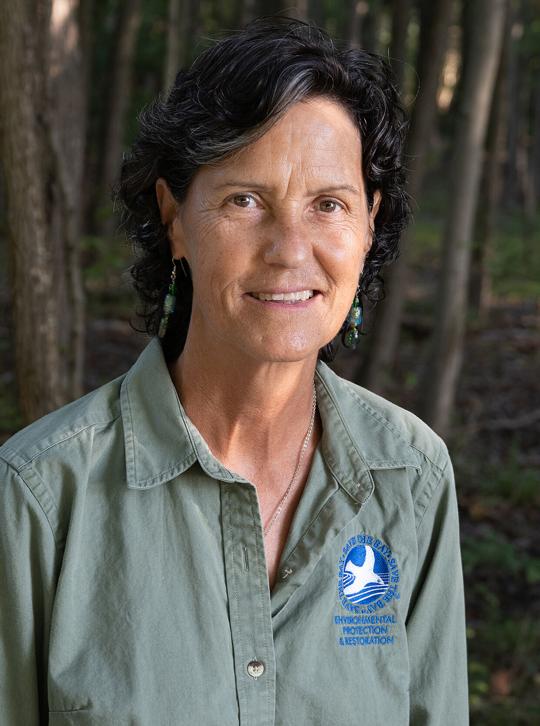
Conowingo was built in 1928 to generate electricity, and it inadvertently acted as a trap for nutrient and sediment pollution flowing downstream to the Chesapeake Bay. Over the years, sediment buildup behind the dam has reduced its pollution-trapping capacity. Photo by Dave Harp
The long-running and litigious debate over Conowingo Dam’s impact on the Chesapeake Bay has resumed, with all sides still entrenched, at least for now.
Six months after a federal appeals court vacated Constellation Energy Corp.’s license to generate hydropower at the dam on the lower Susquehanna River, the Maryland Department of the Environment has called a parley with representatives of the company and of the environmental groups that successfully challenged the license. The initial meeting of the parties was June 21.
At issue is what the state will require of Constellation to reduce nutrient and sediment pollution flowing downriver through the dam to the Bay. In a letter inviting lawyers for the other two parties to meet, MDE officials said they were going to resume reconsideration of a tough water quality certificate, or permit, for the dam that it had issued in 2018, triggering a legal donnybrook in which both the company and environmental groups filed lawsuits.
“We’re not sure how this is going to go for all of us,” said Betsy Nicholas, a consultant to Waterkeepers Chesapeake, a coalition of 17 riverkeepers around the Bay watershed which with the Lower Susquehanna Riverkeeper, had sued. MDE has never dealt with a situation like this before, she said.
Completed in 1928, the 94-foot-high dam straddles the Susquehanna about 10 miles upriver from the Bay. Until about a decade ago, it captured a portion of the nutrients and sediments washing down the river. But now its 14-mile reservoir is mostly filled, and those pollutants from farm runoff, municipal wastewater and stormwater flow through Conowingo and into the Chesapeake, where they contribute to algae blooms and other water quality woes. Storms or heavy rains also flush a surge of pollution, trash and debris from behind the dam into the Bay.
Five years ago, after years of studies, MDE had ordered the company, as a condition to keep operating the dam, to either deal with that untrapped pollution or pay the state $172 million a year to have it done. The federal Clean Water Act effectively gives states veto power over federal licenses or permits for construction projects or facilities like the dam that may affect states’ waters.
But Constellation, then a part of Exelon Corp., sued MDE in response, contending that Maryland was placing an “unfair burden” on the company to address pollution its dam did not generate.
In 2019, MDE and the company reached an out-of-court settlement, under which it agreed to provide more than $200 million to rebuild eel, mussel and migratory fish populations in the river. It also offered help with nutrient and sediment pollution flowing into the Bay, though much less than the state had initially required. In turn, the state waived its right to impose its previous conditions on the dam’s operating license.
Environmental groups and others objected to the deal. But the Federal Energy Regulatory Commission, which regulates hydropower facilities, issued a new license for Conowingo with no other conditions. The waterkeepers groups then sued, and in December 2022, the U.S. Court of Appeals for the District of Columbia ruled that the commission should not have accepted the deal and vacated Constellation’s license to run the dam. The court said Maryland could either uphold its original certification or toss it and have the company apply for a new one.
After first engaging in private talks with Constellation, MDE wrote the company and environmental groups on June 1 inviting them to present any new or previously overlooked information they believe is relevant to assessing the dam’s impact on water quality downriver and in the Bay. MDE also is inviting public feedback on the issue, with Aug. 1 set as the deadline for all comments and new information.
“Ensuring a revitalized Chesapeake Bay for the benefit of all Marylanders is a top priority,” MDE Secretary Serena McIlwain said in a statement issued by the department. “As we move ahead with the reconsideration of the 2018 Water Quality Certification, we will be transparent, we will welcome input and we will work collegially with all parties for a healthier and more vibrant Bay.”
Environmentalists want MDE to stick to its original requirements.
“We’re hoping that they see at the end of the day that they made the correct choices in 2018,” said Lower Susquehanna Riverkeeper Ted Evgeniadis. MDE “provided a water quality certificate that was adequate to protect water quality,” Evgeniadis said, “and we hope they uphold that … without any changes.”
A Constellation spokesman indicated the company wants MDE to honor the deal they negotiated.
“While we believe another round of comments is an unnecessary step,” spokesman Bill Gibbons said in an email, “Constellation will participate in the re-opened reconsideration process to support the long-term future of the state’s largest source of renewable energy and to demonstrate that our settlement agreement with Maryland offers the best possible outcome for the state and the Bay.
Gibbons urged MDE to “come to a speedy conclusion” so the company could carry out the cleanup measures it agreed to in the deal, which it values at $700 million. Meanwhile, Constellation continues to generate power under a temporary extension of its expired license.
But MDE’s review may just be the opening round in another legal bout that could take several more years to conclude. Betsy Nicholas, a consultant to Waterkeepers Chesapeake, said if MDE sticks by its earlier requirements or substantially reduces them, one side or the other is sure to demand a “contested case hearing.” That is a trial-like process at which all sides can present evidence and testimony and cross-examine witnesses. And if anyone disagrees with the outcome of that hearing, they can then file a lawsuit in state court, with appeals possible all the way to Maryland’s Supreme Court.
Evgeniadis and Nicholas say that while they want to see MDE stand by the water quality requirements it originally set, they hope an acceptable compromise can be negotiated among all parties, one that deals with the pollution while perhaps adjusting Constellation’s financial burden.
One possible framework for a new deal is a plan Bay watershed states developed in 2021 for dealing with the pollution impacts of the dam. It calls for reducing the annual flow downriver of nitrogen by 6 million pounds and of phosphorus by 260,000 pounds. The estimated price tag: $53 million, only part of which the states have pledged so far to cover.
Alison Prost, the Chesapeake Bay Foundation’s vice president for environmental protection and restoration, said she believes Constellation has a role to play in reducing that pollution.
“I don’t believe they should take up the entire burden, Prost said. But, she added, “this is an opportunity to bring them into the fold.”













